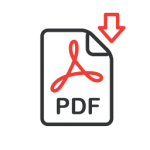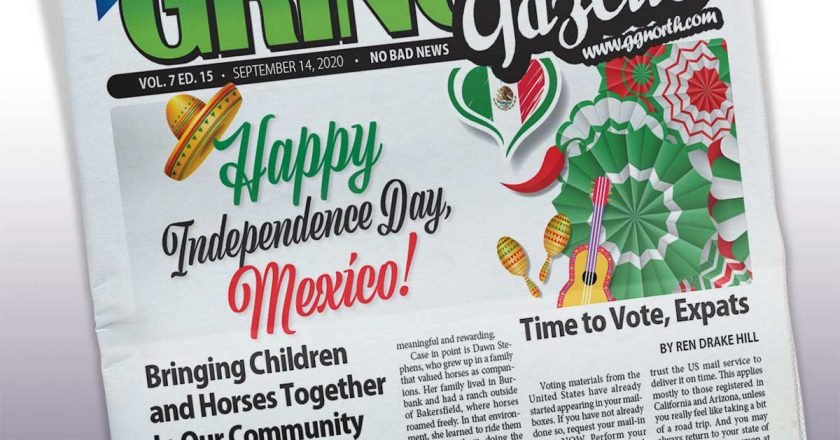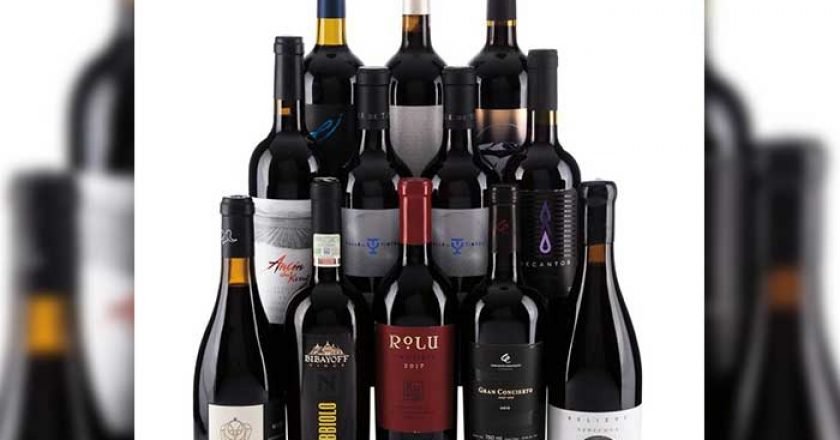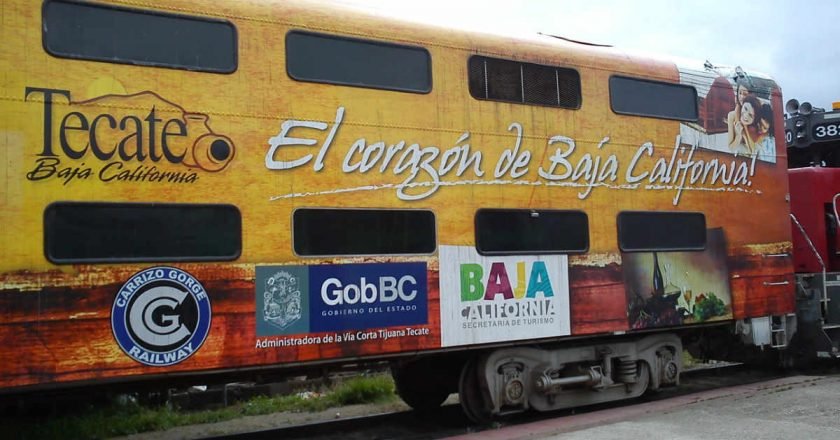



The bodies of Ian Hirschsonhn and Kathy Harvey that were reported missing two weeks ago were found at the bottom of a water well in Ensenada.
According to Ian’s daughter, they couldn’t be lost as the 77-year-old man knew the area very well, as he frequently visited since 1985.
Kathy and Ian were last seen in their truck, which was found abandoned seven days later.
On September 4, San Diego’s Police Department, where the couple was from, confirmed that the bodies were Hirschsonhn y Kathy Harvey.
Hiram Zamora, a local prosecutor in charge of the case, said to the press that they were both murdered in their house by a drug addict who wanted to steal from them.
The suspect, who has already been identified, moved their bodies from El Socorrito (near San Quintin) to the city of Ensenada, where they were later found.
The couple rented a house near El Socorrito beach, a popular area for American retirees.

Mortons Auctions, the most important auction house in Mexico, announced an upcoming auction of wines and liquors this past week. The virtual event will include variety of Mexican wines, from popular labels to collectibles, with a unique selection of wines from Baja California thanks to a partnership with Provino.
The auction will be online and is scheduled for this coming Thursday, September 10 at 4:00PM (local time), 6:00PM (Mexico City time).
Casa de Piedra, Vena Cava, Cava Maciel, Las Nubes, Emeve, Corona del Valle Alximia, Madera 5 and Monte Xanic are some of the wineries that you will be able to find in the catalogue.
The auction is already online on the bidsquare platform, click here to check it out and place a bid.
Sorry US residents; these wines can only be shipped to Mexico addresses.

Mario Escobedo, head of the state economy and tourism office, said that the Tijuana-Tecate passenger train is already on the works with an initial investment of 136 million USD for a 17 miles section.
He stated that the train would be a secure, sustainable option to connect with Tijuana and Tecate, with seven stations and two terminals. A minimum of 30,000 passengers are expected to use the train every day.
This project should not be confused with the already present tourism train that goes from Tijuana to Tecate (pictured above).
Initially, the project considered a route to Ensenada. And although the plan hasn’t been cancelled, Escobedo stated that “it’s not a priority right now”, mainly because the current state government administration will only last two years and will not be able to finish a project of such magnitude.

Soldiers from the Mexican Army seized a massive load of a variety of drugs in the La Rumorosa area in Tecate.
The illicit drugs were found in an inhabited area about 6 miles south from the La Rumorosa town.
The army reported that 1 ton of crystal meth was found, along with 6 kilos of powdered fentanyl and 5,000 pills of that same drug. About 5.3 kilos of heroin and 4 gallons of marihuana (THC) oil were also found.
The army stated that the bust would considerably affect the financial structure of local crime organizations since the total street value of the drugs was about 16 million USD.
The drugs were found abandoned on a dirt road when the military was doing a surveillance drive through the area. No arrests were made in connection with the drugs.

BY ORLANDO GOTAY / TAX ATTORNEY
If you are a US person who runs a business in Mexico and have not heard about OFAC, perhaps you should. OFAC (Office of Foreign Asset Control), is part of the US Treasury. It administers dozens of programs related to trade and economic sanctions to further US national security interests.
OFAC foreign asset control programs designate both foreign individuals and entities for economic sanctions. Some of these are country focused, such as Cuba, Iran, Venezuela and North Korea. Others are broader, making designations under Global Terrorism, Narcotics Trafficking and “Kingpin” lists, among others. Because these are economic sanctions, the lists include entities in which target persons have a majority ownership too, even if the named entities themselves have no actual relation to what got the “owners” on the list. This is the so-called “Specially Designated Nationals (SDN) and Blocked Persons” list.
Sanctions are a bad thing. One does not want to be on these lists. Why is this relevant to you? Great question!
If you are a US person, you are not allowed- in fact, you are prohibited by federal law- from doing business, receiving or giving property to anyone on these lists. OFAC has a comprehensive database of listed persons and entities that change constantly. I just searched it to figure out how many entries it had for Mexico; it returned over seven hundred names. On the basis of a name alone, some businesses would hardly be noticed. There is a childcare center, hotels, even an air taxi service. But the rule is there and it’s on you to not do any business with listed persons.
Why? Because, you can be fined for a violation of OFAC sanctions if you have prohibited transactions with sanctioned persons. More serious cases could warrant more comprehensive actions, ranging all the way to criminal prosecution.
Compliance with these rules can be burdensome. There are screening services that will clear names for you. If you are operating a souvenir shop somewhere, you may not need to do much screening. If you are a real estate developer, the scope of your activities could be such where it may be worth the while, maybe even critical, to screen against the OFAC list.
Of course, the screening universe includes not only clients, but even partners and service providers. Remember, it’s on you not to do business with them! You were told.
Orlando Gotay is a California licensed tax attorney (Master of Laws in Taxation) admitted to practice before the IRS, the U.S. Tax Court and other taxing agencies. His love of things Mexican has led him to devote part of his practice to federal and state tax matters of U.S. expats in Mexico. He can be reached at tax@orlandogotay.com Facebook: GotayTaxLawyer or WhatsApp at +17604491668. This is just a most general outline. It is informational only and not meant as legal advice.

On Saturday, August 8th, Victor Diaz, loving husband and father of 4, passed away at the age of 77 in Tijuana.
He was born in Mexico City on December 1st, 1942, although he lived his final years in Rosarito, where he helped countless families move between the US and Mexico with his business “Fletes y Mudanzas Diaz”.
Mr. Diaz, an honest man of strong convictions, was very well appreciated in the local community, especially by the staff of this newspaper where he was a good friend and a client for over 5 years.
He is survived by his wife Juanita Ramirez, his four children, Victor Hugo, Jose Humberto, Leo Kenneth and Omar Saul, his 7 grandchildren and 2 great-grandchildren.
He will be greatly missed.

Big Brother will be watching you more closely when you enter the US from Mexico. More comprehensive screening technology may be installed at an inspection station near you! Even though cross-border traffic is severely limited, tens of thousands of pedestrians and motor vehicles cross to and from California daily.
Way back in the 1980’s Congress mandated (in US Code 1365b) that the entry and exit of all foreigners be biometrically recorded. They are recording American travelers too. In February, House Bill 5273 (Securing America’s Ports Act) was passed. This bill requires the Department of Homeland Security “to report to Congress a plan to…scan all commercial and passenger vehicles entering the US at a land port of entry using large-scale non-intrusive inspection systems.” DHS would then periodically report to Congress on the progress of implementing the plan, which would eventually be increased to 100% of all vehicular traffic.
The X-ray and Gamma Ray systems currently in use in Tijuana are time-consuming and inefficient. According to Border Now magazine, only 15% of commercial vehicles and 1% of private cars are scanned by these methods.
A pilot biometric program was instituted at the Otay Mesa crossing, primarily to identify foreigners (i.e. Mexicans) who were travelling on expired visas and/or stayed in the United States past their permitted date.
Many airports in North America instituted Biometric Facial Recognition software that automatically matches a person’s face with their passport photo, a process reported to be 97% accurate. However, if one’s appearance has changed, a secondary review is required. When I travelled to Nova Scotia in 2019, the camera was unable to take an acceptable photo of me to match the photo on my passport. Therefore my printed form displayed a blank face. I passed through customs without a second glance from the border patrol officer. So much for security.
A $28.8 million (US) was awarded to Viken Detection, maker of the two X-ray systems being employed at US borders, in October 2019 for the handheld scanner. There was no information on the cost of the under-car X-ray detection units. Jim Ryan, CEO of Viken Detection, states that a combination of these two systems are powerful “in the fight against drugs, human trafficking and terrorism that targets critical infrastructure;” instead of merely relying on camera-based methods and drug-sniffing dogs.
Currently, the United States has installed Osprey X-ray scanners to detect drugs and contraband underneath motor vehicles entering Texas from Mexico. Since this technology has been designed specifically for high-density border crossings it is expected to be implemented at the Tijuana border crossing in the future. While these vehicles are being safely X-rayed, a border patrol agent will be dutifully checking the identification and documentation of all passengers with hand-held devices that are already in use at many US border crossings.
The CBP is not confirming the identification of all of the southern points of entry that will receive one or more of the new screening instruments at this time, but it’s safe to say that one or more of these technological advances will be implemented at the Tijuana crossing in the near future.
Attempts to obtain additional information on the detection systems from Viken Detection were unanswered.

Mexican Foreign Minister Marcelo Ebrard proposed that border crossings with the United States be “closed” until September 21st, citing the continued spread of coronavirus in both countries. Per Aristegui Noticias, “Currently the US has had a resurgence in… the south belt, which is the southern part and so the border could not be opened now.”
Mr. Ebrard further acknowledged that the restriction of land border crossings has severely impacted trade and the economy on both sides of the border for the past six months. He emphasized “prioritizing health.” There has been a 48% drop in the VAT (Value Added Tax) paid through customs versus this time last year, and a decrease of 36% in the General Import Tax.
This may not be the final word on “closing” the border. The closure may be extended through October 21st, if necessary.

If you are like me, you don’t really want to dwell on death and dying. But it’s September, and in Mexico that means it is the month to draw up your Last Will and Testament, Mexican style. “Mes Del Testamento” or “Testament Month” is the chance to have your Mexican will created with a cost reduction of about 50%, or more.
Expats living in Baja should know that your American (or Canadian) Last Will and Testament does you no good if you happen to pass away while in Mexico. Now, if you don’t own your home and don’t have a lot of personal property, you probably don’t have a lot of need for a Mexican will. However, if married, this document will come in handy if and when the surviving spouse wants to sell a house, car, or other property.
There are several types of wills, but the “Open Public Will” suffices for most people. These wills can be simple and straightforward or inclusive of many clauses (Simultaneous Death Clause, No Contest Clause, etc.) depending on your individual situation.
There are several differences between wills in the US and Mexico. In Mexico, one must retain a notario (notary) to complete the Last Will and Testament. Obtain a form from the notario and fill it out completely. If you do not know Spanish, have someone knowledgeable help you. Take the completed form and two identical handwritten copies of your will. No photocopies allowed. The will must be signed and dated to conform to the Baja California Civil Code. In some cases you may be required to have your Mexican will translated into Spanish by a court-approved translator.
You must also bring an official ID with photograph and signature, and two color copies front and back. Acceptable IDs are a driver’s license (Mexican or country of origin), a Mexican voter’s card, valid passport, and/or permanent or temporary Mexican residency card. You must bring two witnesses with their official photo ID’s and two color copies as well. The notario will translate your will into Spanish and have it signed by you and your witnesses if you have not already done so.
The rules of will-making vary from state to state, so if you own property in two different states you will probably be required to have two separate Mexican wills drawn up. The cost varies by state and by the individual notario, depending on several factors, including the amount of property involved and the number of people involved. In September all notarios reduce their rates, but as of this writing, rates had not been set.
There is a list of licensed notarios at https://www.NotariadoMexicano.org.mx. Click on “Directorio” at the top of the page; click “notarios”, then select Baja California, and choose a notario from any of the cities listed. There are two registered notarios in Rosarito, Mr. Luis Armando Durazo and Ms. Ana Cecilia Thomas.
It is important to know that in Mexico there is no “right of survivorship” as there is in the US, so it is extremely important to have a will for each spouse handled by the notario. If the couple has children, said children are the direct heirs of all properties and the spouse very well could legally end up with nothing if not so stated in the will.
Certain assets such as your life insurance, bank account funds, owned home, and Fideicomiso may already have their dispensations to beneficiaries and legally transferable, but other personal property such as cars, boats, coins, jewelry, and stamp collections are all up for grabs unless their dispensation is officially recorded by the notario in your Mexican will. It is also wise to cross-reference your “country of origin” wills and any of the items listed above in your Mexican will to avoid any confusion among heirs.
Without a will registered in the national database, the government will divide your property among surviving heirs, not including your spouse.
So get your elements and witnesses together. Remember, there are many others with the idea to cash in on this annual event, so a phone call to a local notario is a must. There is a lot of information online to help you with your preparation. Google “Mexican wills” and check out the information most relevant to your situation.